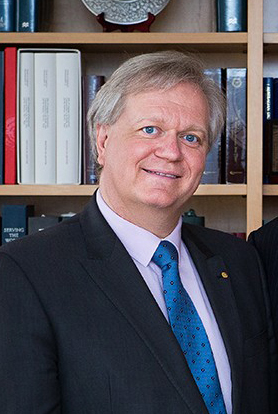
At the 65th annual edition of the Lindau Nobel Laureates Meetings, held from June 28-July 3 in Lindau, Germany, on the shores of Lake Constance, 65 laureates gathered with 650 young scientists from 88 countries for a week of lectures and discussion that included several calls to action.
Laureates Francoise Barré-Sinoussi and Peter Agre joined their voices in the call for expanded recognition and support of scientists in Africa. Laureate Richard Roberts urged his colleagues to reverse European opinion on GMO crops in order to facilitate their wider use in the developing world. And 2014 Peace Prize winner Kailash Satyarthi made an impassioned speech urging the attendees’ commitment to end the exploitation and enslavement of children and support their universal right to education.
But most prominent—and formal—was raised on the final day of the conference, held on nearby Mainau Island: a call to address climate change. 2011 Physics laureate Brian Schmidt introduced the Mainau Declaration 2015 on Climate Change, signed by 36 Nobel laureates, to the hundreds of laureates, scientists and other attendees. “Nearly 60 years ago, here on Mainau, a similar gathering of Nobel Laureates in science issued a declaration of the dangers inherent in the newly found technology of nuclear weapons—a technology derived from advances in basic science,” he said. “We believe that our world today faces another threat of comparable magnitude.”
While Schmidt acknowledged that there were laureates who did not want to publicly express an opinion, he stated that “those of us who sign do so because we feel we have a moral-bound duty as a scientist on an issue that has such lasting consequences…We say this not as experts in the field of climate change, but rather as a diverse group of scientists who have a deep respect for and understanding of the integrity of the scientific process.”
Beyond being a statement of laureate concern and support, the Declaration was very squarely aimed at Paris. “We believe that the nations of the world must take the opportunity at the United Nations Climate Change Conference in Paris in December 2015 to take decisive action to limit future global emissions,” the declaration read. It was then ceremoniously signed onstage by the laureates to sustained applause.
After the ceremonies, the conference attendees returned by boat to Lindau to celebrate the finale of an extraordinary opportunity to spend a week with enough Nobel laureates to field seven baseball teams. Amid the farewells, there was discussion of the significance of the declaration as well as questions over not signing because one was not “an expert in the field,” a position in which the rest of the public also finds itself. One laureate, speaking off the record, explained, “As a citizen, I agree with the conclusion of the declaration, but to sign as a laureate makes me uncomfortable. I felt as a scientist, it would be like signing a research paper I didn’t write.”
As history-making as the declaration was, it was perhaps ironic—or at least awkward—that even as Laureates called for unity, one of their own, Ivar Giaever, the 1973 Physics laureate, had used his lecture at Lindau to rehash a handful of well-worn and unrelated points often made by global warming deniers, including how money spent trying to understand, reverse or mitigate global warming would be better spent helping the poor. But it was roundly dismissed by scientists as intellectually lazy. As laureate Peter Doherty commented in a press conference on Lindau the day before the declaration, “All scientists are comfortable with skepticism. But the difference between skepticism and denial is that the skeptic engages. If you are a skeptic, you talk to other researchers, you look at the data. If you’re in denial, you simply reject everything that’s being published.”
What the scientists seemed to agree on was that they hoped that in addition to their remarkable week with the laureates, they had also been witness to a historic commitment.
More Must-Reads from TIME
- Cybersecurity Experts Are Sounding the Alarm on DOGE
- Meet the 2025 Women of the Year
- The Harsh Truth About Disability Inclusion
- Why Do More Young Adults Have Cancer?
- Colman Domingo Leads With Radical Love
- How to Get Better at Doing Things Alone
- Michelle Zauner Stares Down the Darkness
Contact us at letters@time.com